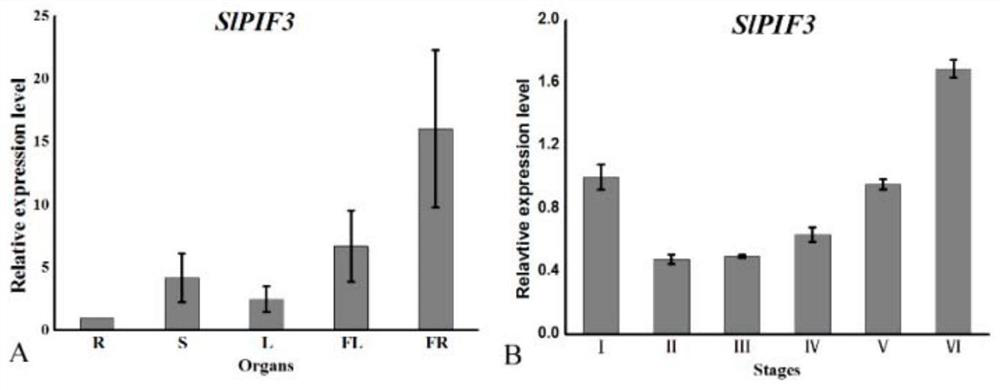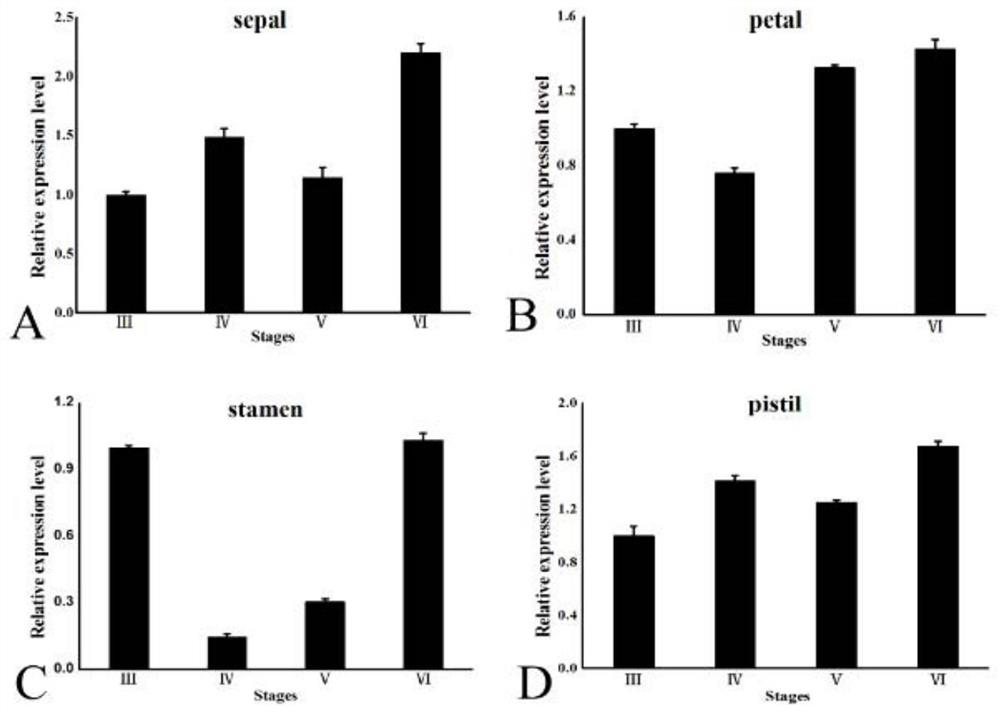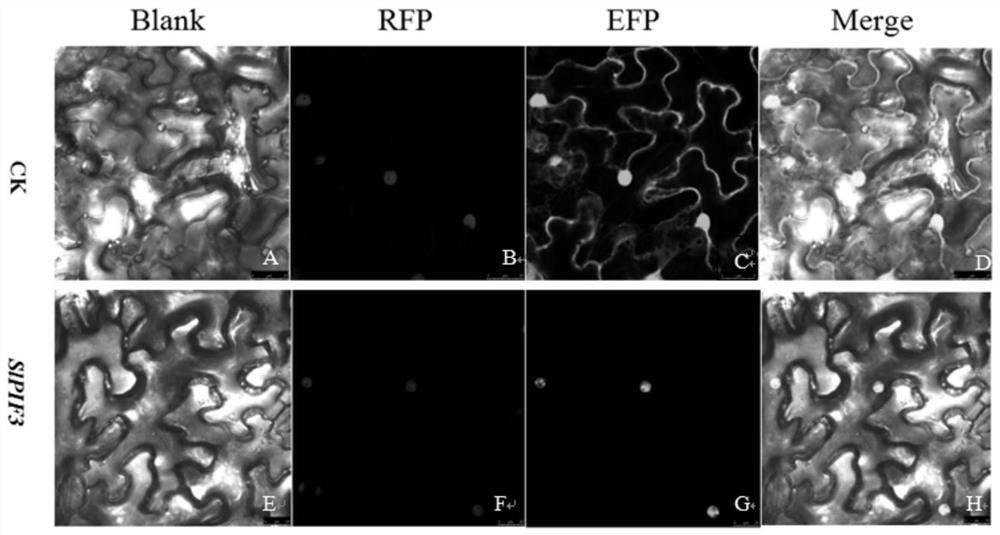Using the slpif3 gene to create a regulated tomato nuclear male sterile line and its creation method and application
A male sterile line and genetic technology, applied in the fields of application, genetic engineering, plant genetic improvement, etc., can solve the problems of pollen abortion and other issues
- Summary
- Abstract
- Description
- Claims
- Application Information
AI Technical Summary
Problems solved by technology
Method used
Image
Examples
Embodiment 1
[0033] The spatiotemporal expression of embodiment 1SlPIF3 gene in different tissues and organs of tomato
[0034] The spatiotemporal expression of SlPIF3 in different parts of tomato was detected by using the cDNA of different organs, different stages of flower development and different parts of the flower of the tomato variety "Micro-Tom" as templates. SlUbi3 in tomato was selected as an internal reference gene, SlUbi3-F: 5'-TGGTCGGAATGGGACAGAAG-3' (SEQ ID NO: 4); SlUbi3-R: 5'-CTCAGTCAGGAGAACAGGGT-3' (SEQ ID NO: 5) The target gene SlPIF3 was designed The primer sequence is: SlPIF3-F1: 5'-AGAAGGATAACTTTCCCCACT-3' (SEQ ID NO: 6), SlPIF3-R1: 5'-GCACTGCTACCAGAACATACA-3'SEQ ID NO: 7), all primers were synthesized according to the instructions of primers Dilute for use. like figure 1 The indicated SlPIF3 is expressed in various organs of tomato, and is predominantly expressed in flowers and fruits. Second, the expression of this gene gradually increased with the continuous deve...
Embodiment 2
[0035] Example 2 The subcellular localization and promoter analysis of SlPIF3
[0036] The CDS sequence of the SlPIF3 gene was amplified by KOD high-fidelity enzyme using tomato 'Micro-tom' leaf cDNA as a template. Designed primer sequences Upstream primer SlPIF3-F2: 5'-CGCGGATCCATGGCTATTGGGAAGCCTG-3' (SEQ ID NO: 8), downstream primer SlPIF3-R2: 5'-GCTCTAGACAAACTGGGACCAGCTTCAT-3' (SEQ ID NO: 9). The pFGC::SlPIF3-GFP vector was further constructed. Subcellular localization of SlPIF3 by transient transfection of tobacco. The 2000bp promoter sequence upstream of SlPIF3 was isolated from the tomato SGN database, and the cis-acting elements of this promoter were predicted on the PlantCare website. The SlPIF3 promoter sequence contained multiple CAAT-boxes and TATA-boxes, as well as multiple A hormone response and a response element to stress. Using DNA extracted from tomato 'Micro-tom' leaves as a template, the SlPIF3 promoter sequence was amplified with KOD high-fidelity enzyme...
Embodiment 3
[0037] Example 3 Obtaining of Tomato SlPIF3 Transgenic Plants
[0038] (1) Vector construction
[0039] Construction of SlPIF3 knockout vector: design two SlPIF3 vectors according to http: / / cbi.hzau.edu.cn / cgi-bin / CRISPR and http: / / www.genome.arizona.edu / crispr / CRISPRsearch.html Target gene sequences sgRNA1 and sgRNA2. The designed target gene sequences were sgRNA1: 5'-AAACCTTGTGCTGCTCGAGG-3' (SEQ ID NO: 10); sgRNA2: 5'-AGCTGCAGAGGTGCATAATT-3' (SEQ ID NO: 11). First, the synthesized sgRNA1 / 2 sequence and its corresponding complementary sequence were annealed to form a double strand, and the formed double strand sgRNA1 / 2 was connected to the AtU6-26SK carrier. Then U6-26-sgRNA1 / 2-SlPIF3 was connected to the digested 35S-Cas9SK vector. Finally, the constructed gene knockout vector U6-26-sgRNA1 / 2-SlPIF3-35S-cas9SK was connected to the final transformation vector pCAMBIA1301 vector.
[0040] Construction of control empty vector and SlPIF3 overexpression vector: In order to fac...
PUM
 Login to View More
Login to View More Abstract
Description
Claims
Application Information
 Login to View More
Login to View More - R&D
- Intellectual Property
- Life Sciences
- Materials
- Tech Scout
- Unparalleled Data Quality
- Higher Quality Content
- 60% Fewer Hallucinations
Browse by: Latest US Patents, China's latest patents, Technical Efficacy Thesaurus, Application Domain, Technology Topic, Popular Technical Reports.
© 2025 PatSnap. All rights reserved.Legal|Privacy policy|Modern Slavery Act Transparency Statement|Sitemap|About US| Contact US: help@patsnap.com



